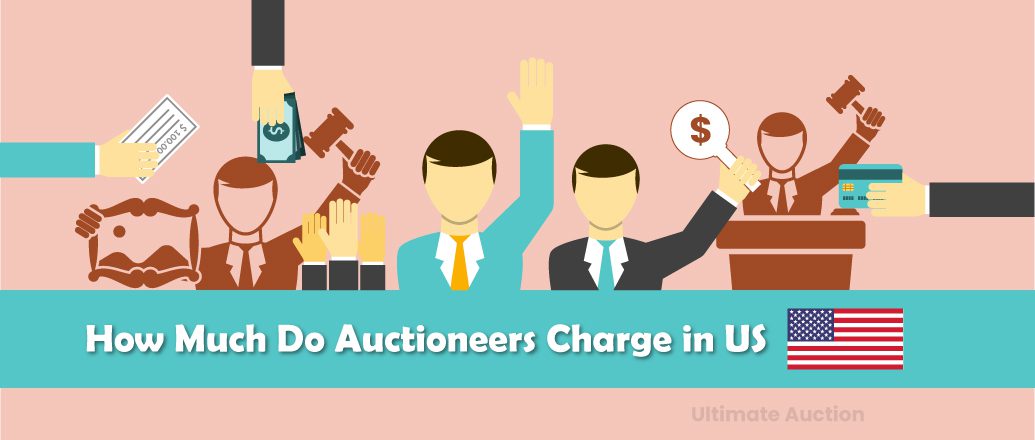



Auctioneers, those charismatic individuals who master the art of rapid-fire chanting and gavel-pounding, play a vital role in the world of auctions. Whether you’re an antique collector looking to offload a treasure trove or a business owner seeking to liquidate excess inventory, understanding how much auctioneers charge in the United States is crucial. In this guide, we’ll break down the costs associated with their services.
The process of becoming an auctioneer is not easy as they have to follow many guidelines and understand how auction licenses are granted in the US. To start, let’s make clear what auctioneers do. They’re like the leaders of auctions, guiding everything with their unique way of talking. Auctions can be different, like selling old stuff from a house or valuable art, and even online auctions on websites like eBay. Each type caters to a specific market and clientele, offering distinct advantages for sellers.
Now, let’s get to the heart of the matter: how much do auctioneers charge? The answer is not a simple one, as fees can vary widely based on several factors. Numerous factors influence the situation, encompassing the auction’s format, the assessed value of the items up for bidding, the auctioneer’s renown, and even the location at which the auction is taking place. Sellers should be prepared for a range of fee structures, which we’ll explore in greater detail as we progress.
Get ready for a deep dive into the world of auctioneer fees. We’ll unravel the mystery surrounding the costs linked to these exciting events, so you can confidently decide how to buy or sell things at auctions in the United States.
When it comes to how auctioneers charge for their services, there are several methods they commonly use. Understanding these payment structures can help you navigate the world of auctions more effectively.
1. Commission on Auctions: One of the most common ways auctioneers earn their fees is through a commission. This is a percentage of the total sales at the auction. Typically, auctioneers charge around 10% to 20% of the gross sales as their commission. Sometimes, they might also receive bonuses depending on the specific deal. It’s important to note that auctioneer fees can be subject to state laws, with some states setting maximum rates, while others have no specific limits.
2. Minimum Selling Fee: Some auctioneers set both a commission rate and a minimum fee. This allows them to choose the higher payment between the two, depending on the situation. For instance, if an auctioneer charges a 10% commission or a minimum fee of $1500, and the auction results in $10,000 in sales, they would charge the minimum fee because it’s higher than the $1000 commission they would earn.
3. Buyer’s Premium: In certain auctions, there’s an extra cost added to the winning bid, known as the buyer’s premium. This additional fee supplements the auctioneer’s earnings. For example, if an item’s winning bid is $1000 and the buyer’s premium is 8%, the final cost for the bidder would be $1080. Auctioneers earn their commission percentage and the buyer’s premium percentage based on the total sales of the auction.
4. Hourly and Fixed Rate: Some auctioneers opt for an hourly rate. They get paid a specific amount for each hour they work. Auctioneers can also set a flat rate, receiving a predetermined sum regardless of the hours they put in or the total sales proceeds of the auction. For estate auctions, which often involve selling a wide range of items, auctioneers might charge a flat rate with additional fees for advertising or labor costs related to the auction setup. You can use this auction cost calculator to know more.
In this section, we will dissect the average fees charged by auctioneers for various categories like real estate auctions, car auctions, fine art auctions, farmland auctions, and more.
1. Residential Real Estate Auctions
On average, you might encounter auctioneer commissions ranging from 2% to 5% of the final sale price for residential real estate auctions. Keep in mind that these percentages can fluctuate based on factors like the property’s value, location, and the specific auctioneer’s reputation. Additionally, there may be advertising and administrative costs associated with these auctions, which sellers should factor into their budget.
2. Commercial Real Estate Auctions
Commercial real estate auctions typically involve higher stakes and more complex transactions. As a result, auctioneer fees can also be higher. On average, sellers might be looking at auctioneer commissions in the range of 3% to 7% of the final sale price.
3. Farmland Auctions
Agricultural land, with its unique considerations, has its own fee structure. Auctioneer fees for farmland auctions can range from 1% to 5%. However, these fees may also include additional costs related to soil testing, surveying, or zoning assessments, depending on the property’s characteristics.
4. Car Auctions
When it comes to vehicle auctions, auctioneer fees are relatively straightforward. Most vehicle auctioneers charge a fixed fee per vehicle sold, which can vary widely. On average, you might encounter fees ranging from $100 to $500 per vehicle. This fee typically covers the auctioneer’s services, and it’s a critical factor for sellers and buyers to consider when determining their costs or potential profits.
5. Fine Art Auctions
Fine art auctions, often featuring high-value items, have their own fee structures. Auctioneer commissions for fine art auctions tend to be on the higher end, ranging from 10% to 20% of the final sale price. These auctions may also include buyer’s premiums, which are additional fees paid by the winning bidders on top of their winning bid.
Auctions can be an exciting way to buy and sell items, but auctioneer fees can add up quickly. If you’re looking to save money while still enjoying the benefits of auctions, there are several strategies you can employ. Let’s explore how you can save money on auctioneer fees.
 When working with traditional auctioneers, negotiating the commission rate is a savvy move. Auctioneers often have some flexibility in their fees, especially if you have valuable items to sell. While they might have standard rates, it’s worth discussing your specific circumstances and exploring whether they can offer a lower commission.
When working with traditional auctioneers, negotiating the commission rate is a savvy move. Auctioneers often have some flexibility in their fees, especially if you have valuable items to sell. While they might have standard rates, it’s worth discussing your specific circumstances and exploring whether they can offer a lower commission.
Moving your auctions to an online platform is a game-changer in terms of reducing costs. Online auctions typically come with lower overhead expenses compared to traditional in-person auctions. You can reach a broader audience, which can lead to more competitive bidding, potentially increasing your profits. Plus, you can avoid the expenses associated with renting physical auction spaces.
One of the most effective ways to save on auctioneer fees and take your auctions online is by using a WordPress auction plugin. These plugins are designed to seamlessly integrate with your existing website, giving you full control over your auctions. auctionplugin.net offers a powerful auction script that’s easy to set up and use, making it an excellent choice for site owners looking to add auctions to their websites.
Cost-Effective: With a WordPress auction plugin, you eliminate the need to pay hefty auctioneer commissions. Instead, you have a one-time purchase or subscription fee for the plugin, which can be a significant cost savings over time.
Customization: The auction website builder plugin allows you to tailor your auctions to your specific needs. You can set your own auction rules, starting bids, reserve prices, and more. It’s a flexible solution that adapts to your unique requirements.
Seamless Integration: WordPress auction plugin seamlessly integrates with your website. Your visitors can participate in auctions without leaving your site, creating a seamless user experience.
User-Friendly: You don’t need to be a tech expert to use this auction script. It comes with a user-friendly interface that simplifies the auction setup and management process.
Getting started with the WordPress auction plugin from auctionplugin.net is a straightforward process.
Understanding how much auctioneers charge in the US is crucial for anyone considering buying or selling at auctions. The fees vary according to the auction type and the items involved. Auctioneer fees may include commissions, minimum fees, buyer’s premiums, hourly rates, or flat rates. The key is to do your research, negotiate when possible, and explore cost-effective options like WordPress auction plugins to maximize your savings.
If you’re seeking a budget-friendly approach to reduce auctioneer fees and conduct online auctions efficiently, opting for a Ultimate Woocommerce Auction Pro Plugin with comprehensive features is an excellent choice. It empowers you to take control of your auctions, customize them to your liking, and reach a broader audience, all while avoiding hefty commission fees.